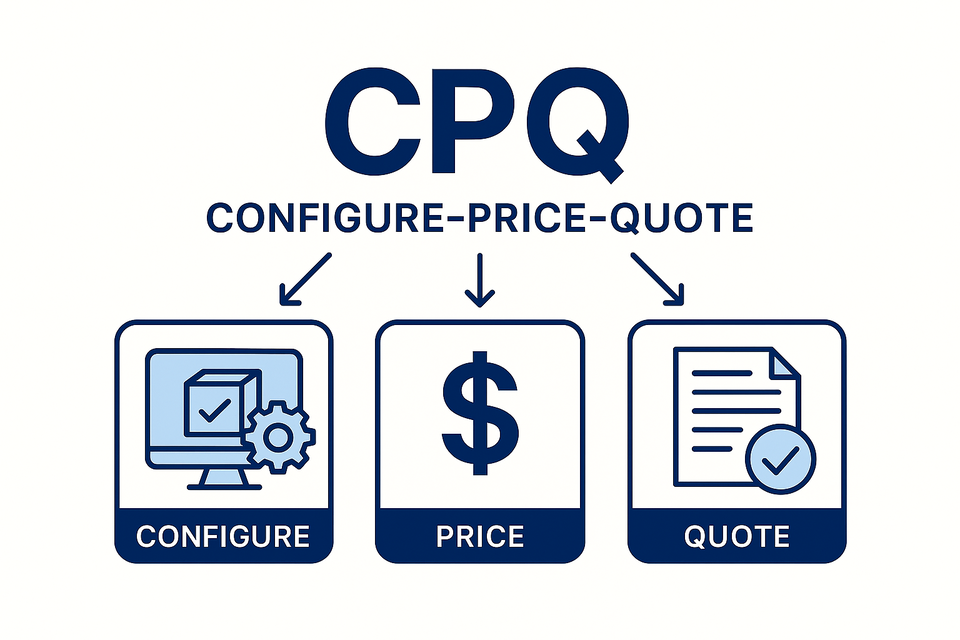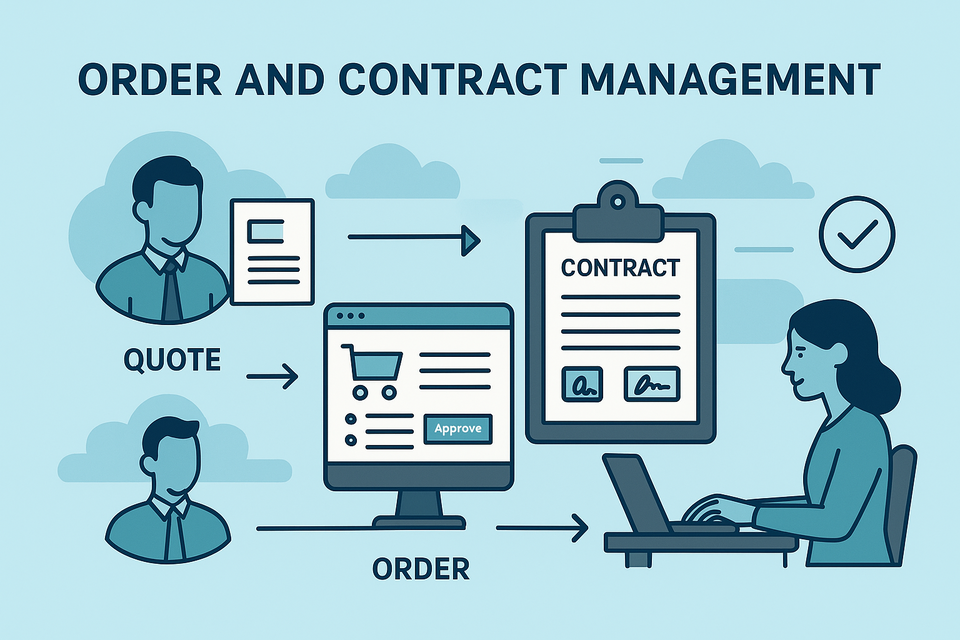CPQ tools automate critical sales tasks, enabling teams to swiftly configure products, calculate accurate prices, and generate professional quotes. This overview explores Salesforce CPQ, Salesforce’s cloud-based CPQ offering, and how it elevates sales automation and revenue optimization.
What Is CPQ?
Configure-Price-Quote refers to software that streamlines the end-to-end process of configuring products, pricing them, and quoting deals. In essence, CPQ solutions help sales teams create tailored offerings for customers without manual errors or delays. A modern Configure-Price-Quote system allows users to configure complex product or service combinations, automatically apply pricing rules, and quickly produce a quote document for customer approval.
What Is CPQ in Salesforce?
CPQ for Salesforce is Salesforce’s own Configure-Price-Quote solution, tightly integrated into the Salesforce Customer Relationship Management (CRM) platform. If we give the Salesforce CPQ definition, we will say that it’s a cloud-based solution that extends Salesforce Sales Cloud functionality by enabling sales reps to configure products, price orders, and generate quotes all within their familiar CRM environment.

Key Features of Salesforce CPQ
Salesforce CPQ offers a rich set of features to support dynamic pricing, complex product configurations, and end-to-end quote-to-order workflows. Some of its key features include:
Product configuration
At the heart of Configure-Price-Quote is a powerful product configuration engine. Salesforce CPQ allows sales teams to configure even complex, multi-component products with ease. Users can select base products, then choose options, add-ons, or customizations from a product catalog with predefined configuration rules. These rules ensure only valid combinations of features or components are selected, eliminating errors in product selection.
Pricing management
Salesforce Configure-Price-Quote provides flexible automated pricing management to handle complex pricing scenarios. Pricing rules and calculators are built into the platform so that the correct price is computed based on the configured product and applicable discounts or markups. Teams can define dynamic pricing rules such as volume or tiered discounts (e.g. automatically applying a discount for higher quantities purchased), regional price adjustments (to account for local currencies, taxes, or market conditions), promotional discounts, and customer-specific pricing agreements.
Quote generation
Generating polished, detailed quote documents is a core capability of Salesforce Configure-Price-Quote. Once a product configuration and pricing are finalized, the system can instantly produce a quote or proposal document. These quote documents include an itemized list of the configured products/services, all pricing breakdowns (unit prices, discounts, taxes, totals), and predefined terms and conditions.
Order and contract management
Salesforce Configure-Price-Quote doesn’t stop at quotes – it also streamlines the transition from quote to order and beyond. Accepted quotes can be converted into orders or contracts in the Salesforce system seamlessly. In fact, Salesforce CPQ integrates with Salesforce’s standard objects for orders and contracts, enabling quote-to-cash automation. When a customer is ready to buy, the sales rep can click to generate an Order record from the quote, ensuring the order details exactly match what was quoted.
Integration capabilities
One of the strengths of Salesforce Configure-Price-Quote is its ability to integrate seamlessly both within the Salesforce ecosystem and with external systems. Natively, Salesforce Configure-Price-Quote lives inside the Salesforce CRM, so it uses the same data for Accounts, Opportunities, Products, and so forth. This Salesforce integration means when a sales rep is quoting, they’re drawing on live customer data and inventory or price data, and the final quote information (amount, products) updates the opportunity in real time.
How Does Salesforce CPQ Work?
Understanding how Salesforce Configure-Price-Quote works can help you visualize its impact on the sales process. At a high level, Salesforce Configure-Price-Quote guides sales reps through a structured selling process, automatically handles pricing calculations, and streamlines approvals and analysis. Here are some key elements of how it works in practice:
Guided selling
Guided selling in Salesforce CPQ provides a step-by-step approach for sales reps to configure the right product for the customer. Think of it as an interactive questionnaire or wizard built into the quoting process. When reps begin a quote, they can be presented with a series of predefined questions about the customer’s needs or preferences. Based on the answers, Configure-Price-Quote will filter and recommend suitable products or features. This ensures even less-experienced reps can navigate complex product catalogs and find the optimal solution.
Automated quoting process
Salesforce Configure-Price-Quote works by automating the entire quoting process from start to finish. In a typical manual scenario, a sales rep might spend hours gathering prices, applying discounts, writing up a proposal, and double-checking everything. With CPQ, much of this business process automation is done by the system in seconds. Once the rep has configured the product via guided selling or manual selection, the Configure-Price-Quote engine instantly calculates the price based on all the relevant factors (pricing rules, discounts, quantities, etc.). It then generates the quote document with line items, totals, and terms – all automatically populated. If the quote requires approval (say the discount is higher than what the rep is allowed to give), Salesforce Configure-Price-Quote can automatically route the quote for approval to the appropriate manager with a single click.
Approvals and workflow automation
In complex sales, it’s common to have approval steps – for instance, if a sales rep offers a larger-than-normal discount or includes custom terms, a manager’s sign-off might be required. Salesforce Configure-Price-Quote includes robust workflow and approval automation to handle these scenarios. The system can be configured with approval rules that trigger based on conditions (e.g., discount over 20% or total deal value over $100k). When triggered, the Configure-Price-Quote workflow pauses the quote for approval and notifies the relevant approver in Salesforce. The approver can review the quote details and approve or reject with comments.
Analytics and reporting
Because Salesforce Configure-Price-Quote operates within the Salesforce platform, it can leverage powerful analytics and reporting tools to give management insight into the sales quoting process (sales performance metrics). Salesforce Configure-Price-Quote tracks a wealth of data: quote line items, pricing details, discounts given, approval times, win/loss outcomes, and more. By analyzing this data, sales leaders can identify patterns and areas for improvement.

Benefits of Using Salesforce CPQ
Salesforce CPQ meaning for sales operations lies in its ability to streamline processes, and its impact cannot be underestimated. Here are some of the key benefits that companies experience:
Increased efficiency
One of the most immediate benefits of Salesforce Configure-Price-Quote is a major boost in sales productivity and speed. By automating previously manual tasks (like configuring complex deals or calculating prices), Configure-Price-Quote frees up sales reps to spend more time actually selling.
Improved accuracy
Accuracy in quoting is critical – errors in configurations or pricing can lead to lost revenue, unhappy customers, or costly rework. Salesforce CPQ significantly improves accuracy of quotes by enforcing rules and automating calculations. Because product configuration rules prevent incompatible or unavailable product options, the quotes generated are technically correct.
Enhanced customer experience
Salesforce CPQ not only makes life better for sales teams – it also creates a smoother, more professional experience for customers. Today’s B2B buyers expect quick and tailored responses. With CPQ, sales reps can provide exactly that: accurate and personalized quotes quickly, often on the first call or meeting. Customers no longer have to wait days or weeks for a quote revision when they make changes; the rep can adjust configurations in real time and regenerate the proposal. This speed and responsiveness leave a positive impression, showing the customer that your company is easy to do business with and values their time.
Accelerated sales cycle
By streamlining so many steps in the sales process, Salesforce CPQ ultimately leads to an accelerated sales cycle. Shorter sales cycles mean revenue comes in faster and your team can close more deals in the same amount of time. CPQ contributes to this acceleration in several ways. First, as noted, reps can create quotes faster, which reduces the initial turnaround time to get an offer in the customer’s hands. Second, the built-in approvals process means even when internal checks are needed, they happen swiftly and transparently – no more waiting on emails or chasing down managers in person.
Salesforce CPQ Implementation Best Practices
Implementing Salesforce CPQ is a strategic project that can yield substantial returns if done correctly. However, because CPQ touches many aspects of sales and pricing, it’s important to approach the implementation thoughtfully. Here are some best practices and tips to ensure a successful Salesforce CPQ implementation:
Define clear objectives
Start by establishing clear objectives and requirements for what you want to achieve with Salesforce CPQ. This means identifying the pain points in your current sales process and setting specific goals for the CPQ project. For example, are you aiming to reduce quoting time by 50%? Improve quote accuracy for complex products? Enable self-service quoting for reps or customers? Defining these targets up front will guide all your implementation decisions. It’s recommended to involve key stakeholders in this planning phase – sales leaders, experienced sales reps, finance (for pricing policies), and IT.
Choose the right implementation partner
Salesforce CPQ is a powerful tool, but it also has many capabilities and configuration options that require expertise to set up optimally. If your team doesn’t have prior CPQ experience, it’s wise to engage a qualified implementation partner or consultant who specializes in Salesforce CPQ. The right partner will bring technical know-how and best practices from other projects to ensure your CPQ is configured to match your business needs. When choosing a partner, look for Salesforce CPQ certifications, relevant industry experience, and a track record of successful projects. A good implementation partner will help with tasks like complex product rule setup, developing pricing formulas, and integrating CPQ with other systems (e.g. your ERP or e-commerce). They can also assist in translating your business requirements into the Salesforce CPQ configuration (product bundles, discount schedules, approval processes, etc.) efficiently.
Train your team
No matter how well Salesforce CPQ is set up, its success ultimately depends on user adoption. Training your team – especially the sales reps and quoting analysts who will use CPQ daily – is a best practice that cannot be skipped. Plan for comprehensive training sessions to introduce the new CPQ tool, ideally with hands-on exercises using real-world quoting scenarios from your business. The goal is to make users comfortable and confident in performing their tasks in Salesforce CPQ. Cover how to configure products, apply discounts, generate quotes, and submit for approvals in the training.
Monitor and optimize performance
Going live with Salesforce CPQ is not the end of the journey – the best implementations include a continuous improvement mindset. After deployment, monitor key performance indicators (KPIs) and gather feedback to gauge how the CPQ system is performing. For instance, track metrics like average quote creation time, quote error rate (if any), approval cycle time, and win rates on quotes. These metrics will tell you if the CPQ is delivering the expected improvements (e.g., if quoting time dropped or if sales cycle is shorter).

Why Choose CanvasLogic?
CanvasLogic is a leading innovator in the Configure-Price-Quote space, with deep expertise in visual product configuration and sales automation. Unlike standard CPQ tools, CanvasLogic provides an integrated suite that enables unique, immersive customer experiences in 3D and augmented reality. In other words, we help you take Salesforce CPQ to the next level – allowing your customers to visualize and configure products in real time, which boosts engagement and confidence in the purchase. For example, we built a 3D configurator for Automata (a life sciences company) that lets customers design a custom robotic biolab from scratch, see it in VR, and instantly get a quote with a QR code – a groundbreaking sales experience powered by CPQ. CanvasLogic’s solutions are designed to integrate effortlessly with your existing systems, including Salesforce CRM/CPQ, ERP, PIM, and ecommerce platforms, creating a unified data ecosystem with minimal disruption.
Conclusion
Salesforce CPQ isn’t just about creating quotes – it’s about streamlining your entire sales process and empowering your team to sell smarter and faster. If you’re ready to elevate your sales operations with CPQ, now is the time to take the next step and explore how these solutions can be implemented in your business.
FAQ
What are the prerequisites for implementing Salesforce CPQ?
First, you’ll need an existing Salesforce environment (Sales Cloud org) and the appropriate Salesforce CPQ licenses or packages installed. It’s important to have your product catalog and pricing data well-organized – this means a complete list of products, options, bundles, and defined pricing (including any discount structures or tiers) ready to be loaded into the CPQ system.
What industries benefit the most from Salesforce CPQ?
Many industries can benefit from Salesforce CPQ, but it’s especially valuable for businesses that offer complex or configurable products/services. Very simple product businesses (with one-price-fits-all and no options) might not need CPQ as urgently. But for most mid-size and enterprise B2B companies, CPQ is a game-changer – it brings order and speed to what can be a chaotic quoting process, no matter the industry.
What are the common challenges faced during Salesforce CPQ implementation?
Implementing Salesforce CPQ, while highly rewarding, can come with a few challenges. One common challenge is data migration and integration – consolidating product and pricing data from various sources into the CPQ system, and integrating CPQ with other systems (ERP, billing, etc.) can be complex. Ensuring data consistency (like matching product codes across systems) is critical to avoid issues. Another challenge lies in the customization complexity: configuring the myriad of product rules, pricing rules, customizable workflows, and approval processes to fit your business can be time-consuming. Additionally, setting up accurate contract lifecycle management within the CPQ system requires careful planning to ensure renewals, amendments, and compliance are handled correctly throughout the sales process.



